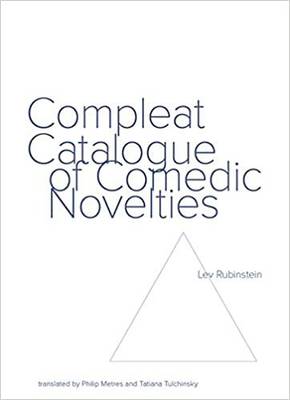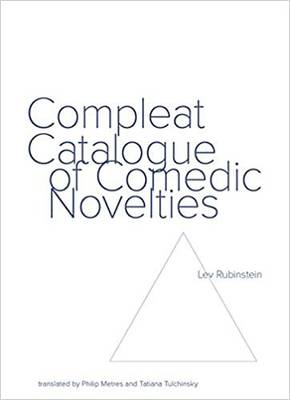
Door een staking bij bpost kan je online bestelling op dit moment iets langer onderweg zijn dan voorzien. Dringend iets nodig? Onze winkels ontvangen jou met open armen!
- Afhalen na 1 uur in een winkel met voorraad
- Gratis thuislevering in België vanaf € 30
- Ruim aanbod met 7 miljoen producten
Door een staking bij bpost kan je online bestelling op dit moment iets langer onderweg zijn dan voorzien. Dringend iets nodig? Onze winkels ontvangen jou met open armen!
- Afhalen na 1 uur in een winkel met voorraad
- Gratis thuislevering in België vanaf € 30
- Ruim aanbod met 7 miljoen producten
Zoeken
Prijzen
Omschrijving
Poetry. Translated from the Russian by Tatiana Tulchinsky. Preface by Catherine Wagner. Almost ten years ago UDP published CATALOGUE OF COMEDIC NOVELTIES, a representative selection of Lev Rubinstein's "note-card poems," a seminal body of work from one of the major figures of Moscow Conceptualism and the unofficial Soviet art scene of the 1970s and 1980s. These texts form what Rubinstein called a "hybrid genre" "at times like a realistic novel, at times like a dramatic play, at times like a lyric poem, etc., that is, it slides along the edges of genres and, like a small mirror, fleetingly reflects each of them, without identifying with any of them." As American scholar Gerald Janecek has noted, the texts are made up of "language ready-mades (commonplace expressions, overheard statements, sentence fragments)" and organized "in such a way that we seem to be observing the creation of a poem from raw material."
Specificaties
Betrokkenen
- Auteur(s):
- Uitgeverij:
Inhoud
- Aantal bladzijden:
- 448
- Taal:
- Engels
Eigenschappen
- Productcode (EAN):
- 9781937027421
- Verschijningsdatum:
- 15/12/2014
- Uitvoering:
- Paperback
- Formaat:
- Trade paperback (VS)
- Afmetingen:
- 137 mm x 190 mm
- Gewicht:
- 544 g

Alleen bij Standaard Boekhandel
+ 39 punten op je klantenkaart van Standaard Boekhandel
Beoordelingen
We publiceren alleen reviews die voldoen aan de voorwaarden voor reviews. Bekijk onze voorwaarden voor reviews.













